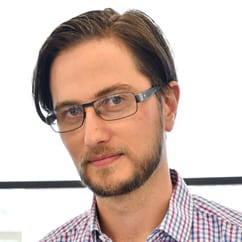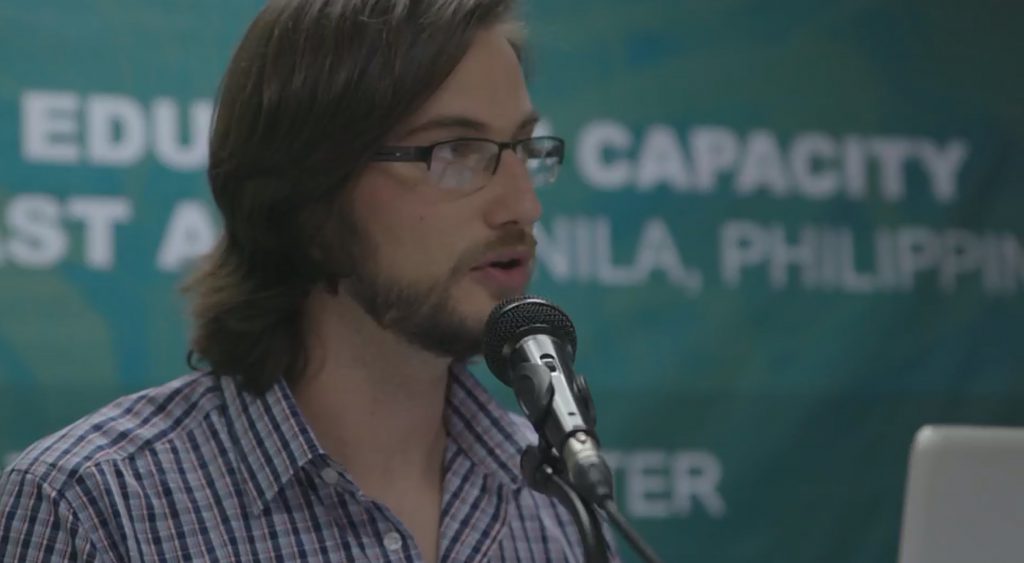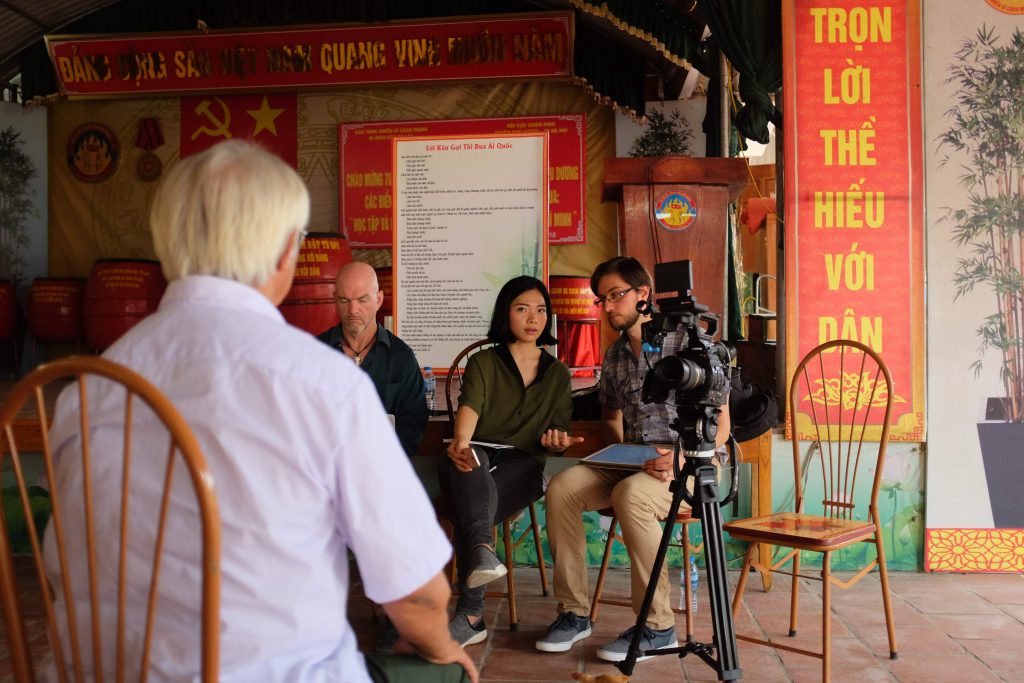The Language of Disasters
How we talk about disasters can impact how we look at policy—and how communities respond

Jason von Meding, Ph.D., is an Associate Professor at the School of Construction Management at the University of Florida and an architect. He is also a founding faculty member of the Florida Institute for Built Environment Resilience (FIBER), and host of the Disasters Deconstructed podcast. The interview has been edited for length and style.
Tell us about your background.
I always wanted to be an architect from when I was like 10 or 11. I grew up in Dublin, Ireland, and went up to Belfast in Northern Ireland for architecture school. I went through to my postgraduate degree and it was 2005, the year of Hurricane Katrina, and so disasters were in the news. I was an aspiring designer and I had to do a thesis, a piece of research. There was a new professor and he was interested in extreme weather events. So I ended up working on a project in New Orleans.
I went over there a couple months after Katrina with a designer’s view of disaster. I did building surveys looking at how different types of designs and materials were affected by storm surge and wind and flooding. So, I produced a piece of work and that was my introduction to research.
| Click here to read about Jason von Meding’s research. |
The year after, I was working in an architecture firm in Belfast and finishing my design thesis for grad school. I was designing floating buildings and some really cool stuff, but I also really got interested in the research. So, I applied for a Ph.D. position and got a scholarship. I had to decide whether to go into full-time practice or do research and I ended up doing research. That is where I went into the disaster field full-time. My doctoral work was in Sri Lanka and Bangladesh. I started working in Southeast and South Asia, looking at post-disaster projects.
That must have had quite an impact on you.
I first went there as a designer, but the more I learned about disasters, the more I understood about the social side. I also got more interested in the management side of projects. I did research on post-disaster project management in that region and ended up really getting into this post-disaster reconstruction field of research. In 2013, I went to Australia. They wanted a post-disaster guy. So I went there to start a research group at the University of Newcastle.
We built up a group and I did a lot of my work there in the Australian context but also continued to work in Asia and in the Pacific. It was 2017 when I first saw that the University of Florida was planning to create a research center, so I applied to the Florida Institute for Built Environment Resilience, which is where I am working now.

Tell us about your work at The Consortium on Trust in Media and Technology.
One of the things important to me is the shift I made towards storytelling, narrative and trying to understand language better. Previously, I was looking more at project management and the technical side of disasters. In the last five years, I have moved toward public communication. A lot more advocacy and actually doing research on language. In terms of the projects I am doing, I am working a lot more with psychology. One of the projects I have been doing right now, which was part of our pitch for the Consortium, is a collaboration with [University of Florida psychology professor] Colin Tucker Smith. We are looking at how we tell stories that build trust between different groups and in the disaster space.
One of the things in disaster studies that we have a big problem with is the focus on natural hazards instead of a more holistic focus on disasters as a combination of things, including the hazard, but other risk factors that come with injustices and inequalities in society. All of the things that come together to create risk are usually not the first thing in our minds when we think of a disaster. One of the problems in my field is that the language we use often “naturalizes” the disaster.
We use expressions like “natural disaster” very often, especially in this country. And there are a lot of negative impacts. We have been looking at that for a few years and there are a lot of scholars who say we need to be careful about that language. But we started getting pushback. And one of the things that spurred us to further action was those who say, “you cannot prove that it has any negative impact. You have all these nice arguments but you do not have the evidence that it actually changes the way that people conceive of disasters.” That was kind of a challenge. It was something Colin and I started to talk about because he does research on why people believe certain things. So that is how we got together.
We started doing experiments to see if there really is a difference in what people understand about a disaster when you use language that frames it as something natural or when you use language that frames it as something that was created by society. We saw some really encouraging results, and we are doing more work on that.
Can you give us an example?
Sure. We set up different scenarios where we did not actually ask people about the expression “natural disaster.” We put together different scenarios where the community was ravaged by an earthquake. First, we put the focus on the earthquake doing the damage. Then, we talked about that same scenario and said it was an earthquake that impacted a community that had been marginalized by decades of political turmoil. It paints a different picture for the reader.
It highlights that the reason this happened was not just because of the earthquake but because of policy positions. We found that people who understood clearly that disasters are coming out of society advocate for social solutions. People who think those factors are basically about the hazard advocate for very technical solutions. There are really clear correlations there. And that is what we are further exploring.

Tell us about your other projects.
One of the things we are working on involves a Black community in North Port St. Joe, Fla. We are doing a photo-voice project, where they are taking photographs and then we are talking with them about the story behind the photographs and putting together a pop-up exhibition.
The whole project was built around the idea of stories as a pathway to empathy, relationship and understanding between groups and communities. They have a lot of historical division up there. If we can create these powerful narratives and they can reach audiences where they may not have an existing relationship, they can build trust there, expose some of the injustices and seek to remedy them.
This is an emancipatory methodology, used to center the experience of a community that has been marginalized or oppressed. We as researchers try to step back and let the community be creative—even design the project to certain extent.
What we are trying to do is to promote the sometimes-hidden narratives that we would not usually uncover. This project is really about the stories of strength and solidarity and resilience in North Port St. Joe. It was originally conceived after Hurricane Michael, but it kind of evolved to capture some of the impact of COVID on their community.
We frame it for them, and then they go take photographs that tell stories, and then we come back together and sort that imagery. We originally intended to do an exhibition at the end of the project, but they wanted to put together a pop-up exhibition that they can take around to different meetings and events.
Tell us more about what you are doing with language. What can we learn about trust?
I think the disaster language is often used as a weapon against the most oppressed. We have talked about the expression “natural disaster” already. One of the ways to use it against the oppressed is to mask over the human choices that we make—especially those in power—that ensure people live at risk.
We see this all the time all around the world, where politicians will come out and say, “there is nothing we can do, it is a natural disaster.” But the reality is that, in that disaster, those who are living under systemic and structural violence are the ones who are affected most.
And there is a lot you can do about that. There is a lot you can do about the underlying risk. To say that we cannot do anything about natural disasters is really dishonest and misleading.
The language can be used against the people we are trying to help. When we use words like “vulnerable” to talk about people in developing countries and whole groups of people, we are taking a very Western lens and often we are behaving in very neo-colonial ways—paternalistic ways.
It sounds like what you are saying is the way we talk about disasters has an impact on the trust of people who are most impacted.
Yes, I think it does. A lot of people in our current climate will immediately disregard whatever Colin and I have to say, because we are coming from an institution. We bring scientific knowledge, but the message is not getting through because of who the messenger is. That is at the core of what we are doing with local stories, local narratives and people’s own words.
Why do people distrust the messenger?
There is a lot of distrust of institutions generally because our society is really set up to benefit those at the top. A lot of these communities only hear nice rhetoric from institutions, but they do not really see much change. They become further and further disillusioned by the lack of action. We are seeing it right now with Covid, which is revealing a lot of these systemic problems.
I think there is a lack of trust in institutions generally. But I have not seen anywhere in the world that has such a distrust of science as in the United States. I think some of that is carefully curated through propaganda, through the promotion of ideologies that are very anti-science.
Some of us working in a university are immediately distrusted when we engage at the grassroots level. I think that it is really important for us to build some legitimacy at a local level, so we can deal with the perception that we are there to extract. In my field, I look at a lot of projects going on and they can get really extractive. So, it is not a stretch to see why people distrust scientists sometimes, especially when they are coming from powerful Western institutions into poor communities and doing research. It is just wrong in so many ways. So I think a lot of it is our own creation. It is not helped by when you have public figures who are so often trying to bang on science.
